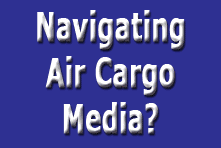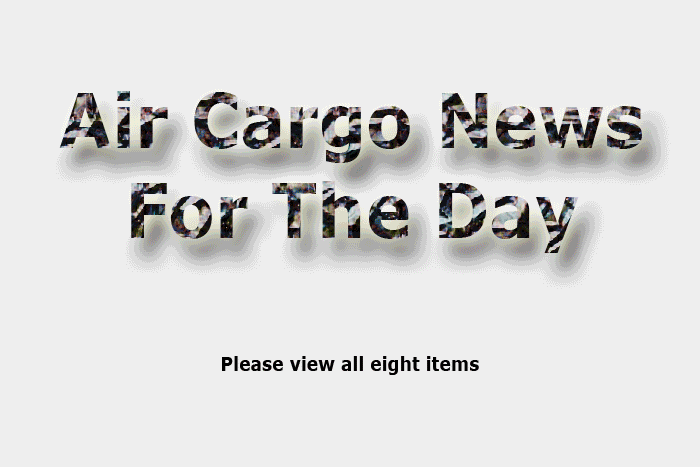| 
  atrick
Murray talks about innovation and building fast growing Calogi with great
enthusiasm and hope. atrick
Murray talks about innovation and building fast growing Calogi with great
enthusiasm and hope.
Murray is no stranger to IT, having been involved with various systems
from British Airways to IATA to Mercator.
But as we have learned, Calogi is building
from the ground up for the world air cargo community.
Amidst a growing number of IT companies,
Dubai-based Calogi is rising quickly, providing a secure Internet service
portal “that offers a one-stop platform for a range of air cargo
businesses from around the world to negotiate and sell products and services
online”.
“Calogi is 24/7 business-to-business
and business-to-consumer cargo logistics network that was developed jointly
by Calogi and Mercator, the IT division of Emirates Group,” Patrick
Murray said.
“Calogi offers a multitude of services,
and since its Dubai launch in July 2008, the number of Calogi subscribers
and transactions have experienced phenomenal growth,” Patrick Murray
says.

"Business is just great, and
we continue to go from strength to strength. In July we recorded our highest
number of transactions ever. And we increased our transactions by over
25 percent versus the previous financial year. Of course, none of this
would have been possible without support from our customers, and so in
April we presented our top performers with special achievement awards
at a dedicated lunch event held at the prestigious Armani Hotel in Dubai.
We recognized cargo forwarders, airlines, and general sales agents (GSAs)
for their support throughout the year.
"While we are on the subject of customers,
twice a year we like to take the pulse of the industry, through an online
survey, to see what our customers think of our services and what they
would like to see us do better. "We were
very pleasantly surprised with the results. Overall satisfaction with
Calogi is extremely high. 70 percent of FF and 60 percent of GSA/ALN rated
it ‘Excellent’ or ‘Very good.’ 75 percent of Freight
Forwarder end users view Calogi as better compared with similar IT solutions,
while 66 percent of GSA/ALN have the same view.

"The push to move our industry to electronic
trading systems has never been so strong. Witness the rash of announcements
of several airlines and IATA of just the past few weeks. E-AWB is on everybody’s
agenda and we now have a real chance to move the industry forward. We
will grasp this opportunity with both hands and do everything in our power
to make this happen. Calogi believes that we have a pivotal role to play
in the transformation.

“We have been very busy with the implementation
of our Road Feeder Services (RFS) Solution for a number of truck operators
in Dubai, including Pan Airport Logistics (PAL) - the largest operator
of roller-bed-equipped vehicles linking various airports across the Middle
East.
“The module gives road feeder service
(RFS) operator’s complete visibility of the shipments allocated
to them through a standard interface with the ground handling system.
"Furthermore, operators can publish
schedules, manage capacity and volume, produce load plans, and send booking
lists to cargo terminal operators. We also use our clearinghouse function
to collect the RFS handling charges on behalf of the terminal.
 "We have made no secret of the fact
that we are developing the electronic consignment security declaration
and we plan to trial this in the London community. This will remove yet
another paper document and considerably speed up the movement of the goods
while they are on the ground.
"We have made no secret of the fact
that we are developing the electronic consignment security declaration
and we plan to trial this in the London community. This will remove yet
another paper document and considerably speed up the movement of the goods
while they are on the ground.
"Also Calogi has just implemented
a branded version of our portal for SNTTA Cargo, the UAE's premier air
cargo general sales agent. Such is the popularity of doing online business,
more than 50 forwarders subscribed to the new web portal on the first
day of its launch. SNTTA can now connect in real-time with freight forwarders.
Agents can request electronic bookings and rates, execute e-AWBs, receive
e-invoices, and raise electronic charges correction advices from SNTTA's
website.

“Our research uncovered that the air
cargo market required an easy-to-use portal in more than one language,
and we responded to those demands by releasing Chinese, Portuguese and
Spanish versions.
The multi-language versions of Calogi support
our international ambitions to penetrate the European, Chinese, and South
American Market. It is worth noting:
1. In Brazil* and Mexico**, less than 5
percent of the population speak English.
2. In Portugal*** less than 27 percent,
3. In Chile**** less than 10 percent
4. In Spain***** less than 22 percent
5. In China****** less than 1 percent.
"What this tells us is that the multi-language
version of Calogi is a must to be able to gain acceptance amongst the
air cargo supply chain stakeholders in these countries. We pride ourselves
on making things easy for our customers and a multi-language version of
our portal seemed a natural progression for us. The multi-language versions
of Calogi are available for immediate use and the language preference
can be selected after logging in as part of the user profile.

"I remember that at Air Cargo Europe, during
the Panel Session 1: In search of innovation at Air Cargo Europe, Prof.
Dr. J. Rod Franklin, P.E., Managing Director, Executive Education Adjunct
Professor of Logistics, The Kühne Logistics University, felt the
industry was trapped in a ‘bunker mentality.’ I think one
of our biggest challenges is to address this and encourage more and more
air cargo stakeholders to adopt online business models. Air Cargo is a
complex business. Customers need simple solutions and yet we continue
to be plagued by paper-based processes and complex Customs procedures,
so how do we make it easy and attractive for our customers to do business
with us.
"Ideally we can encourage customers to do
this by making them the starting point for any development.
"But the main communication tools are still
email, telephone, and fax. We have to change the mindset and automate
as much as we can, reducing the need for call centers, which more often
than not involve lengthy waiting periods.

" The concept of online credit
card payment has yet to make its way into our industry and here I believe
is a huge gap that needs to be filled. I believe this is mainly due to
the cost of credit. Low-cost carriers will be the first to exploit this.
If we see a demand, we will be more than happy to develop and implement
a credit card payment gateway.

"Very soon we will need to look at
how we can maximize the use of smartphones to do business. There are currently
6.2 billion cellular subscribers with no foreseeable downturn in mobile
subscribers. The new generation of mobile users will have a short attention
span and will want business on the move. Trade will move from form-based
applications to text and voice. Air Cargo needs to be ready for the transition.
IATA anticipates that 50 percent of all passenger bookings will be made
through smartphones by 2017. It would be good to see some cargo bookings
made using the same medium.
"There is no doubt that it is becoming
increasingly difficult to create loyalty amongst customers with customers
continually searching for the cheapest rates assuming a certain quality
of services. However, running loyalty programs and allowing customers
to accumulate and convert points into tangibles can often differentiate
service providers when the playing field is level. The challenge is really
to convince air cargo stakeholders that loyalty programs will work for
them."
We ask Patrick, where would he be appearing,
whether he plans on attending FIATA in Singapore. His response is immediate:
"Yes, we will be at FIATA World Congress
in Singapore, along with the dartboard and the iPod/iPad prizes. We will
also be at the IATA WCS in March. I will be speaking and moderating panel
sessions at the Middle East Air Cargo & Logistics Exhibition, which
takes place on April 9th & 10th, 2014, at the Abu Dhabi Trade Center.
I have requests to speak at other events and I am juggling my calendar
to see if this can be managed."
Patrick likes to contribute and is rather
results-oriented. He says, "this year I attended Air Cargo Africa
as speaker. I really enjoyed the event and had the opportunity to meet
with many potential customers. There is a large demand for solutions in
the African market and the potential customers I spoke to see us as an
exciting opportunity. The signing of a partnership agreement in Kenya
gives Calogi a toehold in the African market, from which we can only grow.
"Calogi also exhibited at the World
Cargo Symposium. We were incredibly busy and managed to meet many key
decision makers from the airline industry. As a result we have been invited
to a number of airline head offices to discuss how we can help resolve
some of the business issues they currently have.
"I also had the pleasure of speaking
at Air Cargo Europe. This is the first time I had attended the event,
and there can be no doubt that if you want to meet the key decision makers,
this is the place to do so.
"As a result of attending the above
conferences, we have generated over 20 proposals. We are confident that
we will be able to convert a significant number of these into Calogi customers.
These events are also great places to renew old acquaintances and meet
new people."
We ask him if he could share his feelings
on the major challenges to air cargo (IT) and what should be done toward
improvement.
Patrick thinks about it for a minute, "first
and foremost, as a provider of an Internet-based solution, we are dependent
on the Internet Service Providers for the speed of the application. That
being said, we have taken a fine toothcomb to our application and optimized
the same to ensure that we can operate in many countries where there are
bandwidth restrictions. The obvious advantage of an Internet-based solution
is that you can be up and running instantly and there are no local installation
activities/costs. We still want to see a progressive march to improving
Internet speeds across the globe, but recognize that this will not happen
overnight. Before we sign a partner distribution agreement, we conduct
a full assessment of Internet speeds. If they are below a certain benchmark
we will wait for an improvement.
"Another challenge is still the fragmentation
of solutions and the fact that many systems are still standalone. For
instance, prior to our roll out of the 600+ Calogi Forwarders in Dubai,
90 percent had no means of conducting automated business. We find that
the lack of automation exists in many other markets that we enter. When
we are in market, the IT challenge had effectively been resolved. The
biggest challenge then is to change the mind-set.
"Finally, there is the cost of the
IT solution versus the benefit. It’s very easy to identify the costs,
but sometimes the benefits of automation are not easily recognized.
"We believe that the proof of the pudding
is in the eating and our approach is very simple. We allow our potential
customers to use our system as part of a free pilot. If they are happy
with the product and wish to continue using the service they can convert
to being a subscriber. We believe we have a great solution and once a
potential customer uses the system the immediate productivity gains will
far outweigh the costs."
We want to know what gets Patrick excited
whilst the industry is going through a tough time. He says, "I look
at the opportunities. One thing I know for certain: we cannot wait for
another 30 years to modernize our industry. I think this is a great time
to be providing air cargo solutions, as more and more companies realize
that they need to change and automate the way in which they do business
or the business will simply no longer be there."
SkyKing
|










 Listen to the music.
Listen to the music.